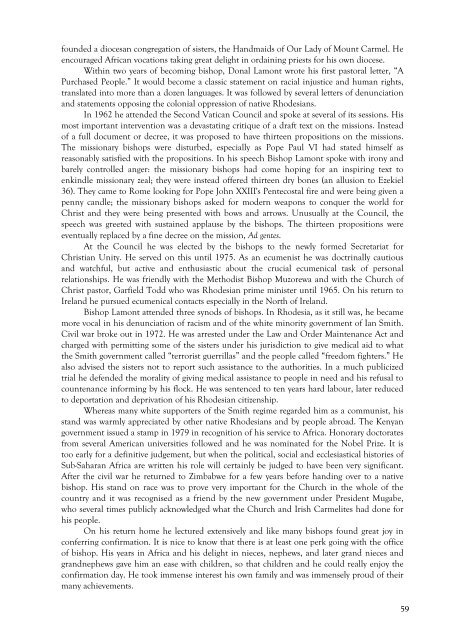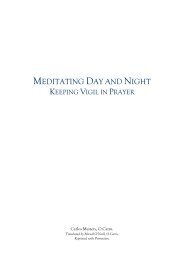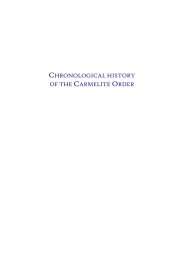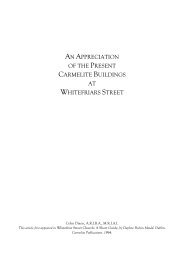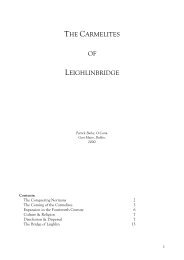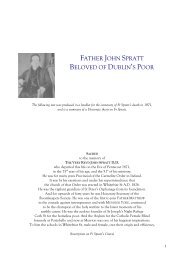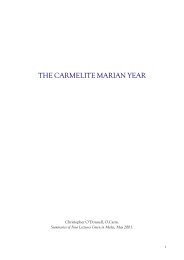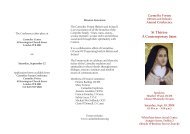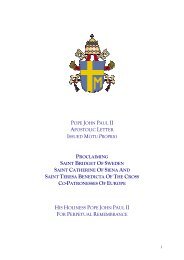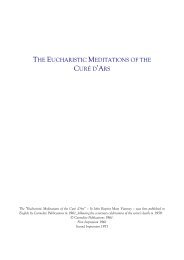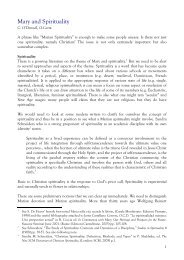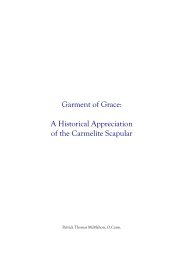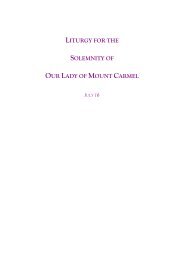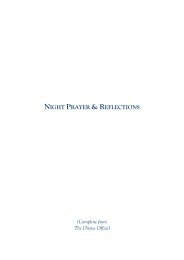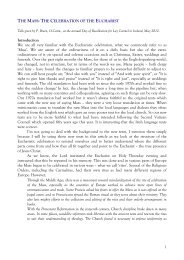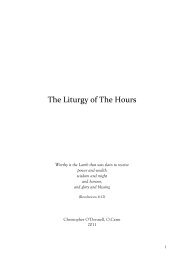The Diocese of Mutare & The Carmelites in Zimbabwe - the Irish ...
The Diocese of Mutare & The Carmelites in Zimbabwe - the Irish ...
The Diocese of Mutare & The Carmelites in Zimbabwe - the Irish ...
You also want an ePaper? Increase the reach of your titles
YUMPU automatically turns print PDFs into web optimized ePapers that Google loves.
founded a diocesan congregation <strong>of</strong> sisters, <strong>the</strong> Handmaids <strong>of</strong> Our Lady <strong>of</strong> Mount Carmel. He<br />
encouraged African vocations tak<strong>in</strong>g great delight <strong>in</strong> orda<strong>in</strong><strong>in</strong>g priests for his own diocese.<br />
With<strong>in</strong> two years <strong>of</strong> becom<strong>in</strong>g bishop, Donal Lamont wrote his first pastoral letter, “A<br />
Purchased People.” It would become a classic statement on racial <strong>in</strong>justice and human rights,<br />
translated <strong>in</strong>to more than a dozen languages. It was followed by several letters <strong>of</strong> denunciation<br />
and statements oppos<strong>in</strong>g <strong>the</strong> colonial oppression <strong>of</strong> native Rhodesians.<br />
In 1962 he attended <strong>the</strong> Second Vatican Council and spoke at several <strong>of</strong> its sessions. His<br />
most important <strong>in</strong>tervention was a devastat<strong>in</strong>g critique <strong>of</strong> a draft text on <strong>the</strong> missions. Instead<br />
<strong>of</strong> a full document or decree, it was proposed to have thirteen propositions on <strong>the</strong> missions.<br />
<strong>The</strong> missionary bishops were disturbed, especially as Pope Paul VI had stated himself as<br />
reasonably satisfied with <strong>the</strong> propositions. In his speech Bishop Lamont spoke with irony and<br />
barely controlled anger: <strong>the</strong> missionary bishops had come hop<strong>in</strong>g for an <strong>in</strong>spir<strong>in</strong>g text to<br />
enk<strong>in</strong>dle missionary zeal; <strong>the</strong>y were <strong>in</strong>stead <strong>of</strong>fered thirteen dry bones (an allusion to Ezekiel<br />
36). <strong>The</strong>y came to Rome look<strong>in</strong>g for Pope John XXIII's Pentecostal fire and were be<strong>in</strong>g given a<br />
penny candle; <strong>the</strong> missionary bishops asked for modern weapons to conquer <strong>the</strong> world for<br />
Christ and <strong>the</strong>y were be<strong>in</strong>g presented with bows and arrows. Unusually at <strong>the</strong> Council, <strong>the</strong><br />
speech was greeted with susta<strong>in</strong>ed applause by <strong>the</strong> bishops. <strong>The</strong> thirteen propositions were<br />
eventually replaced by a f<strong>in</strong>e decree on <strong>the</strong> mission, Ad gentes.<br />
At <strong>the</strong> Council he was elected by <strong>the</strong> bishops to <strong>the</strong> newly formed Secretariat for<br />
Christian Unity. He served on this until 1975. As an ecumenist he was doctr<strong>in</strong>ally cautious<br />
and watchful, but active and enthusiastic about <strong>the</strong> crucial ecumenical task <strong>of</strong> personal<br />
relationships. He was friendly with <strong>the</strong> Methodist Bishop Muzorewa and with <strong>the</strong> Church <strong>of</strong><br />
Christ pastor, Garfield Todd who was Rhodesian prime m<strong>in</strong>ister until 1965. On his return to<br />
Ireland he pursued ecumenical contacts especially <strong>in</strong> <strong>the</strong> North <strong>of</strong> Ireland.<br />
Bishop Lamont attended three synods <strong>of</strong> bishops. In Rhodesia, as it still was, he became<br />
more vocal <strong>in</strong> his denunciation <strong>of</strong> racism and <strong>of</strong> <strong>the</strong> white m<strong>in</strong>ority government <strong>of</strong> Ian Smith.<br />
Civil war broke out <strong>in</strong> 1972. He was arrested under <strong>the</strong> Law and Order Ma<strong>in</strong>tenance Act and<br />
charged with permitt<strong>in</strong>g some <strong>of</strong> <strong>the</strong> sisters under his jurisdiction to give medical aid to what<br />
<strong>the</strong> Smith government called “terrorist guerrillas” and <strong>the</strong> people called “freedom fighters.” He<br />
also advised <strong>the</strong> sisters not to report such assistance to <strong>the</strong> authorities. In a much publicized<br />
trial he defended <strong>the</strong> morality <strong>of</strong> giv<strong>in</strong>g medical assistance to people <strong>in</strong> need and his refusal to<br />
countenance <strong>in</strong>form<strong>in</strong>g by his flock. He was sentenced to ten years hard labour, later reduced<br />
to deportation and deprivation <strong>of</strong> his Rhodesian citizenship.<br />
Whereas many white supporters <strong>of</strong> <strong>the</strong> Smith regime regarded him as a communist, his<br />
stand was warmly appreciated by o<strong>the</strong>r native Rhodesians and by people abroad. <strong>The</strong> Kenyan<br />
government issued a stamp <strong>in</strong> 1979 <strong>in</strong> recognition <strong>of</strong> his service to Africa. Honorary doctorates<br />
from several American universities followed and he was nom<strong>in</strong>ated for <strong>the</strong> Nobel Prize. It is<br />
too early for a def<strong>in</strong>itive judgement, but when <strong>the</strong> political, social and ecclesiastical histories <strong>of</strong><br />
Sub-Saharan Africa are written his role will certa<strong>in</strong>ly be judged to have been very significant.<br />
After <strong>the</strong> civil war he returned to <strong>Zimbabwe</strong> for a few years before hand<strong>in</strong>g over to a native<br />
bishop. His stand on race was to prove very important for <strong>the</strong> Church <strong>in</strong> <strong>the</strong> whole <strong>of</strong> <strong>the</strong><br />
country and it was recognised as a friend by <strong>the</strong> new government under President Mugabe,<br />
who several times publicly acknowledged what <strong>the</strong> Church and <strong>Irish</strong> <strong>Carmelites</strong> had done for<br />
his people.<br />
On his return home he lectured extensively and like many bishops found great joy <strong>in</strong><br />
conferr<strong>in</strong>g confirmation. It is nice to know that <strong>the</strong>re is at least one perk go<strong>in</strong>g with <strong>the</strong> <strong>of</strong>fice<br />
<strong>of</strong> bishop. His years <strong>in</strong> Africa and his delight <strong>in</strong> nieces, nephews, and later grand nieces and<br />
grandnephews gave him an ease with children, so that children and he could really enjoy <strong>the</strong><br />
confirmation day. He took immense <strong>in</strong>terest his own family and was immensely proud <strong>of</strong> <strong>the</strong>ir<br />
many achievements.<br />
59


